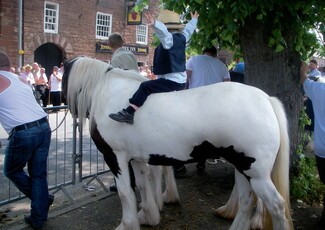Ticket to ride

Gypsies and horses have come a long way together, for five hundred years our fates and way of have life have been closely linked. Yet when the horse-drawn caravan gave way to the motor drawn trailer the relationship never ended. Today Gypsy and Traveller people love their horses as much as ever. Few of us now use a horse to pull our homes, but horses are no less close to our hearts. Maybe it’s because the horse remains a symbol of the freedom we have lost as travelling life has become outlawed.
But if the horse is still a symbol of freedom, horse ownership itself has never been so closely regulated. In 2004 all horse owners were required to obtain passports for every horse they own. And that passport must accompany the horse when it is sold, competed with, exported or slaughtered.
Yet 5 years after the new regulations came into force, nearly 400,000 horses are estimated to not have any papers. The National Equine Database has issued over 980,000 passpor ts but the horse industry estimates that there are currently 1.35 million horses in the UK.
ts but the horse industry estimates that there are currently 1.35 million horses in the UK.
From next month, new EU regulations are coming into force which will tighten these rules. In short, any new foal, plus any horses not previously identified, will need to be micro-chipped as well as have a passport. The new rules will also apply to donkeys, ponies and even zebras.
“Foals born after 1 July 2009 and older horses born before 30 June 2009 that have not yet been issued with a passport must have an electronic microchip implanted by a veterinary surgeon when being first identified,” says a Department for Environment, Food and Rural Affairs (DEFRA) spokeswoman. “Both passport and microchip details will be recorded on the issuers database and centrally on the National Equine Database.” The new rules will also introduce an offence of keeping a horse without a passport.
But with 400,000 horses still without passports, some horse owners are asking why the rules are being tightened. “The strengthening of the link between the horse and the information on its medical treatment stored on its passport is to reduce the risk of unsuitable horses entering the food chain.” says DEFRA. The Department also says that rules will help control horse diseases, reduced horse thefts and prevention fraud in horse sales and competitions.
But with just one month to go before the need for microchipping becomes law, its clear that many within the Gypsy and Traveller community are unaware of the new rules. Whilst few seem to object to the principle of the new rules, many aren’t convinced of their practicality. Horseman and Romany museum proprietor Gordon Boswell says, “I suppose it’s a good idea. But to me the passport hasn’t been a great success, for a dealing man it’s currently just a nuisance. But it’s a good idea if it does end up protecting animals and owners.” 
Like many within the community, Appleby Fair organiser Billy Welch hadn’t heard of the new rules and said; “It just seems like more bureaucracy to me, so I don’t see what good it will do. But I know some lads that have had horses stolen, so microchipping may be of some use.” But with a potential £5000 fine for not following the rules he said that it doesn’t whether the community agreed with the rules, because from July 1st they will be bound by them like everyone else.
A DEFRA spokeswoman said: “Defra recognises the value and status of the horse within the Gypsy and travelling community and will continue to actively engage and educate the community regarding this requirement. The new requirements apply to all horse owners across the EU with no exceptions.
“We do not consider the requirement to identify a foal or older horse to be overly bureaucratic. The cost of correctly identifying a horse is not great when compared with the overall cost to the owners of keeping the animal over its life span. Many horses and ponies owned by the Gypsy and Travelling communities are high value animals and it makes good sense that these go to sale correctly identified as required by law.” DEFRA officers will be at Appleby Fair to explain the new rules to horse owners within the Gypsy and Traveller community.
Horse passports and microchips: the facts
• From July 1st 2009, all any new foal, plus any horses not previously identified, will need to be micro-chipped as well as have a passport.
• Micro-chipping must be done by vets, but DEFRA says that the average cost of implantation is in the region of £60
• Failure to comply could result in fines of up to £5,000 per horse in the UK.
For more information and advice on how to obtain micro-chips and passports, call 08459 33 55 77, visit the DEFRA web site at http://www.travellerstimes.org.uk/admin/www.defra.gov.uk/animalh/id-move/horses/index.htm or email helpline@defra.gsi.gov.uk.
The Gypsy Cob Society is one of the Passport Issuing Organisations approved by DEFRA. It specialises in Gypsy Cob horses but can provide passports for other types of horse as well.
The organisation was established to protect the traditional Gypsy Cob horse breed. The Society will be providing passports at Appleby Fair and otherwise can be contacted at www.gypsycobsociety.co.uk, tel 01768 341 319 or on carol@gypsycobsociety.co.uk.'